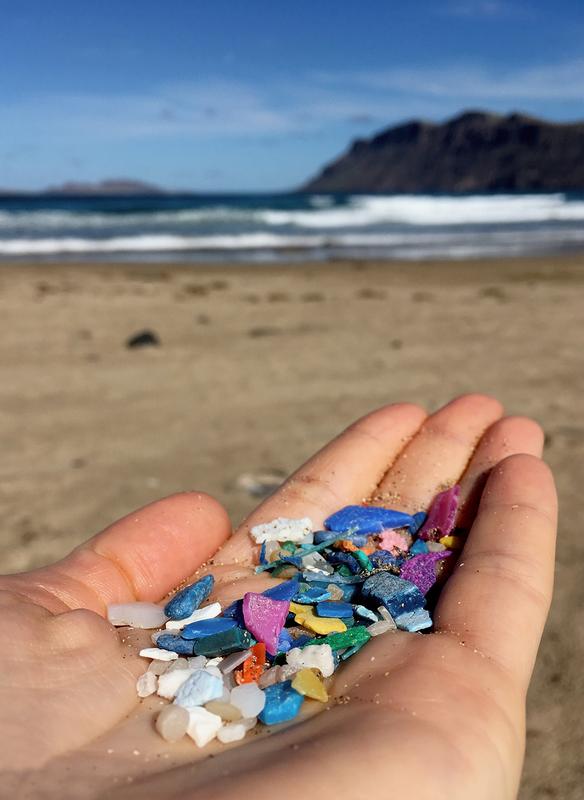Burst Hope: No chance for environment-relieving plastic decomposition by bacteria

Depressing "hand selfie": Marine pollution with plastics is omnipresent, be it at deserted at dream beaches like here on Lanzarote or in even more remote regions like the Arctic. IOW / F. Klaeger
Our waters are polluted with microplastics. Whether it’s fibres from fleece pullovers, plastic pellets from toothpaste or disintegrating plastic bags and bottles: All these small plastic particles eventually end up in the ocean, with unforeseeable consequences for the marine environment.
Since these mini-particles are also colonised by bacteria, the question arose quite early as to whether specific microbes might accumulate on microplastics. Such specialists might even be able to degrade the seemingly indestructible material at some point and thus rid the oceans of this contamination in the long term.
The IOW microbiologists Sonja Oberbeckmann and Matthias Labrenz, who have been working on this question for several years, have now summarised and re-evaluated their own results, as well as those of several hundred studies published worldwide.
They come to the conclusion that the interactions between bacteria and microplastic particles in marine habitats are actually quite limited. Although bacteria colonise these particles, they do not degrade them because the required energy would be far too high.
Moreover, microplastics are so difficult for bacteria to degrade that they are highly unlikely to develop a plastic degradation mechanism under the marine conditions in the future. “This means that we remain on our own dealing with the challenge of getting rid of microplastics. Since we cannot remove it from our oceans, it will continue to accumulate there. Ultimately, this could turn into a ‘chronic disease’ of the affected ecosystems,” Oberbeckmann and Labrenz comment on this particular result of their study.
The two microbiologists are therefore calling for proactive, consistent measures to protect the oceans from plastic waste, such as a significant and timely reduction of plastic-made wealth products (from plastic bags to plastic toys) and recycling systems, which fully realise their potential and can be used cost-effectively worldwide.
However, the extensive review also provided some good news: The frequent assumption that pathogenic bacteria might specifically accumulate on microplastics, and thus would be able to spread rapidly and widely, could not be substantiated. Microorganisms growing on microplastics usually belong to groups that are typical colonisers of particles floating in the sea and do not distinguish between natural and artificial surfaces.
Among them are indeed also harmful bacteria but they do not occur more frequently than on other particles, such as wood or other organic substances. In this respect, microplastics do not pose an increased risk in marine habitats.
Press and public relation:
Dr. Barbara Hentzsch | +49 381 5197-102 | barbara.hentzsch@io-warnemuende.de
Dr. Kristin Beck | +49 381 5197-135 | kristin.beck@io-warnemuende.de
IOW is a member of the Leibniz Association with currently 95 research institutes and scientific infrastructure facilities. The focus of the Leibniz Institutes ranges from natural, engineering and environmental sciences to economic, social and space sciences as well as to the humanities. The institutes are jointly financed at the state and national levels. The Leibniz Institutes employ a total of 19.100 people, of whom 9.900 are scientists. The total budget of the institutes is 1.9 billion Euros. http://www.leibniz-association.eu
Dr. Sonja Oberbeckmann, IOW department Biological Oceanography
Tel.: 0381 – 5197 3464 | sonja.oberbeckmann@io-warnemuende.de
PD. Dr. Matthias Labrenz, IOW department Biological Oceanography
Tel.: 0381 – 5197 378 | matthias.labrenz@io-warnemuende.de
Oberbeckmann, S., Labrenz, M. (2019): Marine microbial assemblages on microplastics: diversity, adaptation, and role in degradation. Annu Rev Mar Sci, https://doi.org/10.1146/annurev-marine-010419-010633
Media Contact
More Information:
http://www.io-warnemuende.deAll latest news from the category: Ecology, The Environment and Conservation
This complex theme deals primarily with interactions between organisms and the environmental factors that impact them, but to a greater extent between individual inanimate environmental factors.
innovations-report offers informative reports and articles on topics such as climate protection, landscape conservation, ecological systems, wildlife and nature parks and ecosystem efficiency and balance.
Newest articles

First-of-its-kind study uses remote sensing to monitor plastic debris in rivers and lakes
Remote sensing creates a cost-effective solution to monitoring plastic pollution. A first-of-its-kind study from researchers at the University of Minnesota Twin Cities shows how remote sensing can help monitor and…

Laser-based artificial neuron mimics nerve cell functions at lightning speed
With a processing speed a billion times faster than nature, chip-based laser neuron could help advance AI tasks such as pattern recognition and sequence prediction. Researchers have developed a laser-based…

Optimising the processing of plastic waste
Just one look in the yellow bin reveals a colourful jumble of different types of plastic. However, the purer and more uniform plastic waste is, the easier it is to…



